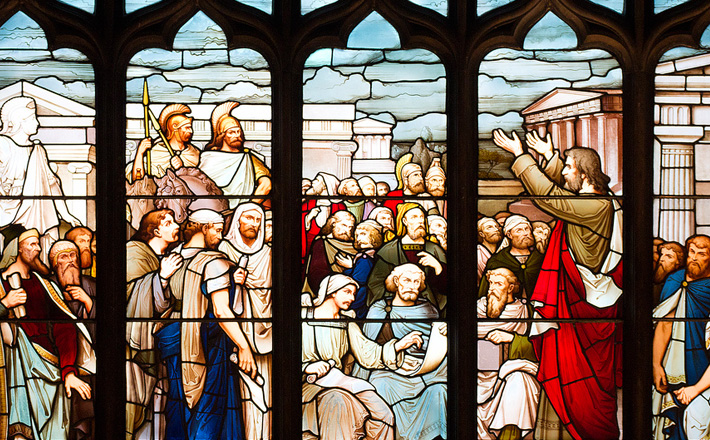Commentary on Psalm 66:8-20
Psalm 66:8-20 is part of a hymn that extols God’s mighty deeds on behalf of God’s people.
God’s mighty deeds on behalf of God’s people. Verses 1-12 are oriented toward the Israelites and how God saved them, pointing specifically to God saving them at the Red Sea (verse 6). But the psalm concludes with the testimony of an individual who thanks God for rescuing her or him out of trouble (verses 13-20). The shift from communal to individual orientation has led some scholars to surmise that Psalm 66 is actually a combination of two psalms that were originally separate.
The two sections of the psalm are connected, however, by the call to “come” and see/hear what God has done (verses 5 and 16). The particular section of the psalm that comprises the lectionary reading ties communal and individual emphases together with the word “bless” (in verses 8 (“Bless our God”) and 20 (“Blessed be God”). If Psalm 66 was performed in ancient Israelite worship, the thanksgiving portion in verses13-20 likely accompanied sacrifices made by an individual who represented the community as a whole.
Verse 8 begins with an imperative addressed to all humankind (“Bless our God, O peoples”), thus indicating that God’s goodness to Israel was to serve as testimony about God’s goodness to all. Verse 9 states again that God saved Israel (“us”) by “keeping us among the living.”
But then verses 10-12a recall how God tested and punished Israel before bringing them “to a spacious place” (66:12b). Hence, these verses reveal God’s true character. The Lord who brought Israel out of Egypt is not just a God who is partial to this people to the detriment of others. Indeed, God shows his concern about justice and equality by rescuing Israel from bondage but also by punishing Israel for unfaithfulness.
This section of the psalm is the reason it is read during the Easter season. That God has “kept us among the living” and “did not let our feet slip” is a metaphor for God’s care for the worshipping community that draws from images of and concerns about the underworld. The psalm shows keen awareness that God is the giver of life, the one who saves the people from slipping into death. It also reveals a crucially important point about Easter: resurrection is not just for the end of life; it is a paradigm for God’s work always to bring us from death to life.
In verse 13 the psalm shifts to first-person voice. It is no longer “all the peoples” who praise God. Now, an individual believer professes faith and makes promises to worship. Verses 13-15 are structured around the psalmist’s promise to bring burnt offerings “into your house” (which probably refers to the temple in Jerusalem). Verse 13a makes this promise initially, and the promise appears again in greater detail in verse 15.
In between is the explanation that such offerings will fulfill the vows the psalmist made when in trouble (verses 13b-14). The vows were not empty pledges or attempts to manipulate God. The offerings made give evidence to that fact. Rather, the vows are a sign of the faith of the psalmist who expressed in them his or her gratitude for and dependence on God.
Verses 16-20 again begin with a plural imperative. This time, however, the call is given by the individual who spoke in verses 13-15 to “those who fear God” to “listen” to testimony of God’s acts for the psalmist (verse 16). The main message is that the psalmist cried out to God and God heeded the prayer (verse 19).
This is general language. It is reminiscent, however, of language in Exodus. The term “listen” appears in Exodus 3:7, and “steadfast love” (verse 20) occurs in Exodus 3:15. So, it seems the exodus story has become the model for the psalmist’s personal experience of being brought from death to life. The account of God’s rescuing the Israelites from slavery has given shape to the psalmist’s own testimony of deliverance.
Verses 16-20 are addressed to “those who fear God.” This description refers to those who stand humbly before God and who worship God rightly as a result. The individual who gives testimony in these verses also speaks as one who “fears God.” He or she praised God (66:17) after carefully examining his or her heart for evil thoughts (“cherished iniquity;” 66:18). This testimony does not claim moral purity. Rather, it claims right relationship with God, relationship characterized by reliance on God for forgiveness and salvation.
The description of sacrifices in verses 13-15 may seem at odds with other psalms that downplay the importance of sacrifices in favor of prayer and spiritual devotion (Psalms 40:6; 50:12-15, 23; 69:30-31; 141:2). These other psalms do not reject sacrifice per se, but the kind of empty ritual the Prophets also rejected (e.g. Amos 5:21-24). Psalm 66, however, presents sacrifice as a way to make faith live.
To be sure, ritual is in some ways not “real life.” It is dramatic, rehearsed, and “staged” action. Nevertheless, ritual is essential for faith for at least two reasons. One, it reminds us that our faith is incarnational. It is always lived faith, public faith. It is never purely personal or internal. Two, ritual can remind us of how we ought to live when we don’t feel like living. In the case of Psalm 66:13-15, the psalmist’s example sets before us the importance of formal expressions of gratitude in response to God’s grace.
This is particularly pertinent to the issue of financial stewardship. The reference to sacrifices in this psalm does not apply to us directly. We no longer make the kind of sacrifices described here. But the purpose of the sacrifice is captured in our tithes and offerings. When we take seriously that giving is a ritual, we remind ourselves that our offerings are thanksgiving for what God has done. They are not responses to a particular service of worship or to a church’s program. By regular giving of our finances we are thus reminded that all of life is to be given in response to God.


May 25, 2014